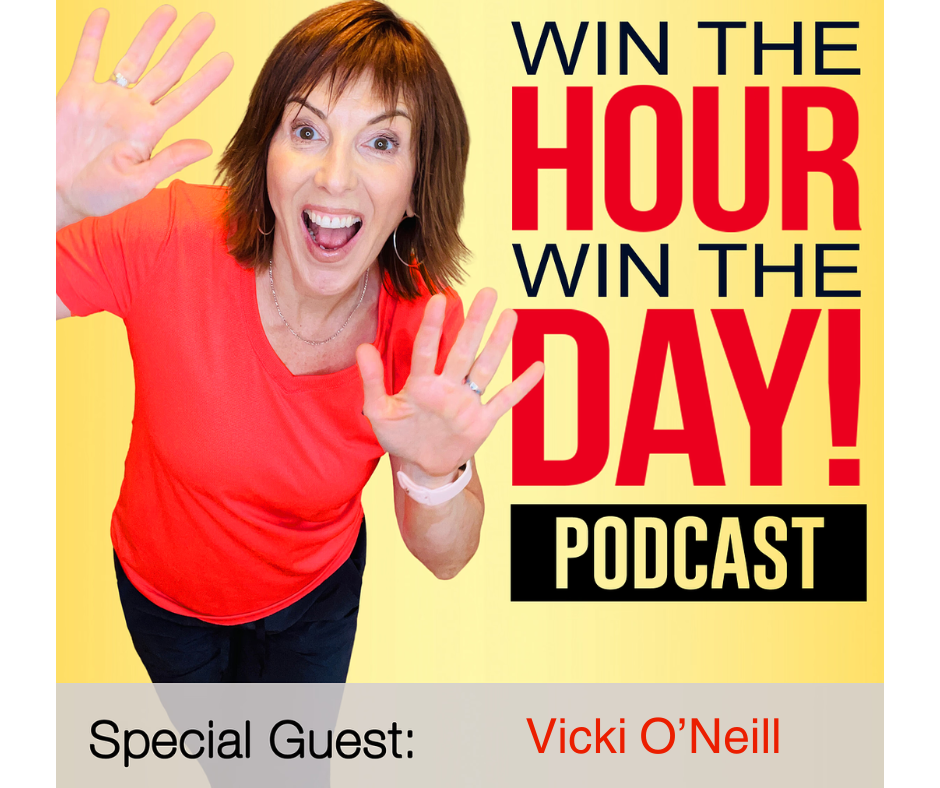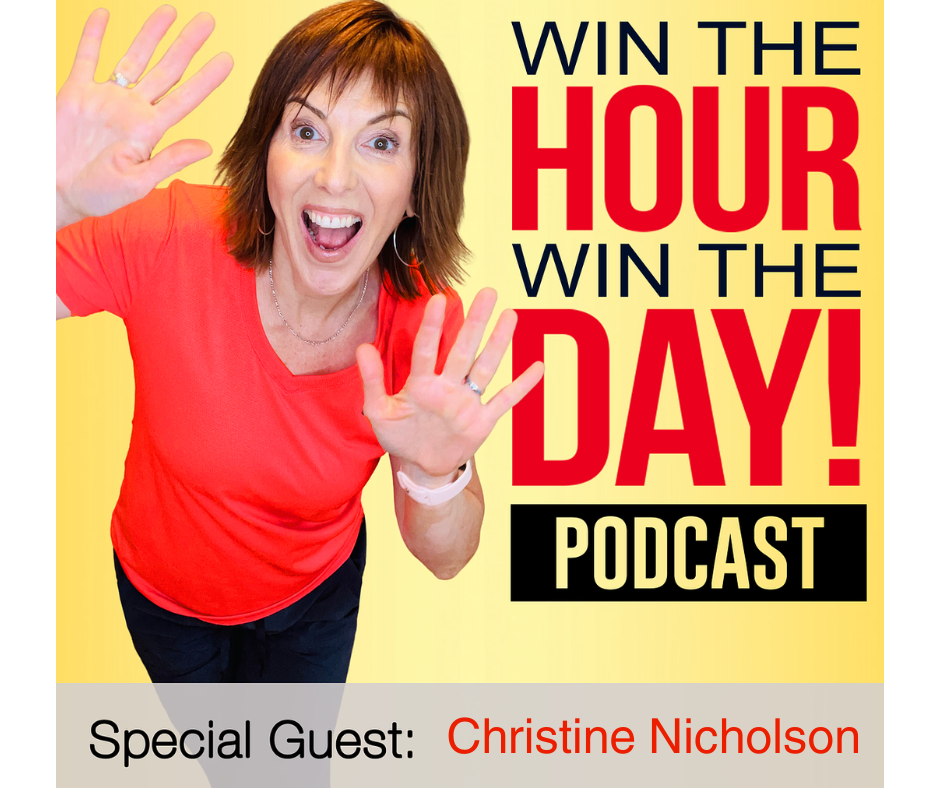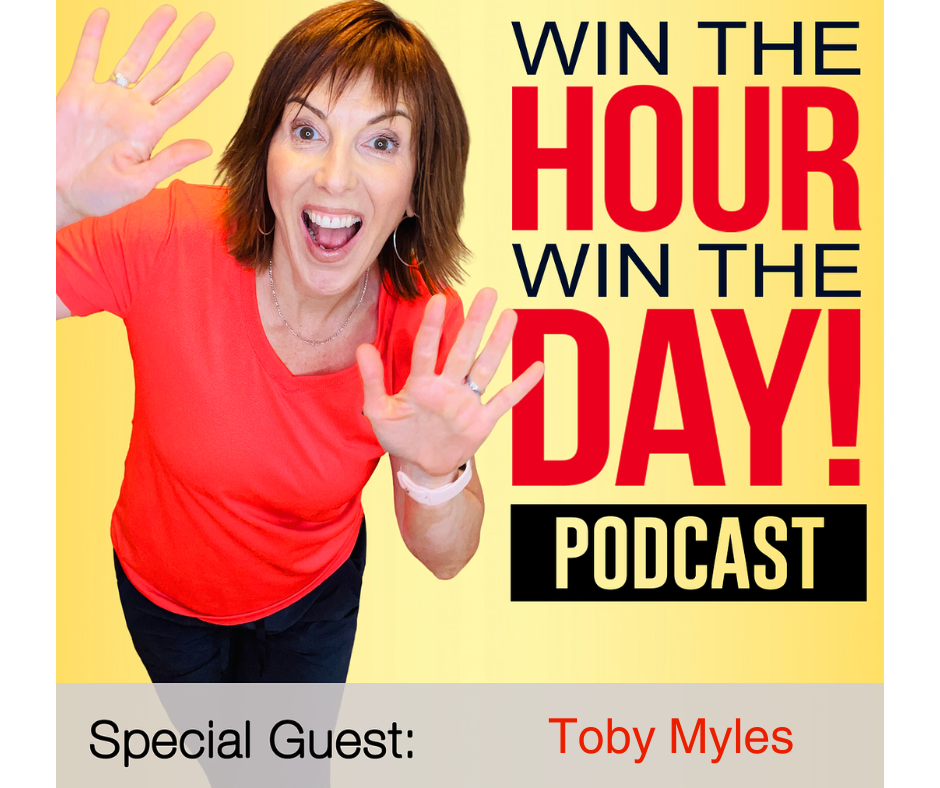Episode Summary
Mari Geasair gives us a whole different way of looking at how we show up in the business world.
Learn:
-how to attract prospects using some basic camera-ready techniques.
-why most entrepreneurs struggle with their online video
-the downfall to presenting and how it hurts your small business
-why most entrepreneurs are doing the exact opposite of what works
-how to easily change your approach today.
Join The Community: https://www.facebook.com/groups/WinTheHourWinTheDay/
Win The Hour, Win The Day! www.winthehourwintheday.com
Podcast: Win The Hour, Win The Day Podcast
Facebook: https://www.facebook.com/winthehourwintheday/
LinkedIn: https://www.linkedin.com/company/win-the-hour-win-the-day-podcast
You can find Maria Geasair at:
Website: https://marigeasair.com/
Facebook: https://www.facebook.com/more.impact.less.stress
Email: coachmarig@gmail.com
LinkedIn: https://www.linkedin.com/in/mari-geasair/
Check out the Outsourcing Playbook For Busy Entrepreneurs here: https://winthehourwintheday.com/outsourcing-playbook
Mari Transcription
[00:06:18] Kris Ward: Hey everyone. Welcome to another episode of Win the Hour Win the Day and I am thrilled to be your host. I am Kris Ward, and today we have Mari Geasair in the house. Okay. Mary’s going to talk to us about video confidence. Okay. Video confidence. She’s a public speaking instructor and she really prides herself on tackling what we call the mental monster Hunter. She’s going to explain all that to us. Welcome to the show, Marie.
[00:06:50]Mari Geasair: I’m so excited to be here. This is going to be fun. Okay. All right. Let’s just, I mean, does that sounds generic? What does a video confidence coach do? Well, I’m really about helping people hit their peak performance on video so that they can get their message across.
[00:07:08] So it’s developing authentic, natural, genuine charisma. So people want to watch them. People want to listen to them. People want to take their ideas and move forward with them, whether that’s hiring them or recommending their book to others or whatever it might be.
[00:07:25] Kris Ward:Okay. So where do you start with that? Like, how do you know you have a problem? Like, what is, you know, there’s so many variables about that, and then there’s the human aspect of it. We all want to be taller, thinner, longer, thicker hair, blah, blah, blah. And that can get in the way. So where do you even start if you’re making excuses or you just don’t see the blind spots or where do we begin with this hot mess?
[00:07:50]Mari Geasair: Well, I love that. And the, the place you start is if you’re making excuses and these techniques are going to help you, if you’re going to be on video, they’re going to help you. If you’re going to be on a podcast, they can even help you. If you’re going to write an email or reach out in a networking event.
[00:08:05] So if you find yourself being one of those people who says, ‘I love doing the thing I do, but I don’t like all that other stuff and I’m putting it off.’ Then it may be time to step back and really work on sort of some charisma training, some confidence training for how you can be a better communicator so that people fall in love with what you do, because we need you to do what you do, but we need to know you before. And a lot of us kind of are hiding without even knowing it.
[00:08:37] Kris Ward: I know a lot of people that could use charisma training. I related to a few of them. Okay. Hold on now. All right. So I’m interested to hear w w w we got to get to the, some of the steps, cause I don’t understand how we can translate them video to email all that stuff.
[00:08:52] So let me give you an example. So I never struggled with being confident. If you asked me to be a speaker, I was fine with that. I used to horrifying my husband cause he was, they just made him nauseous. Like he used to say to me like, Oh my gosh, are you afraid? You’re going to embarrass you, humiliate yourself.
[00:09:08] I’m like, well I’m not, but that’s not helpful. Right? Like, how is that encouraging? He was just traumatized. He couldn’t even watch it. Like I was being on local TV or something and he would leave the room and he’d have to watch him standing. Like it just made him sick that I would do these outlandish behaviors and actually be excited about it.
[00:09:26] So that’s fine. But then when I was on social media, initially, I really struggled with that because I felt as people are walking by, I’m trying to talk at their sleep and they didn’t ask me to be there. So I really was a disconnect there. I would try to be short and polite and Polish shoulders back and be very professional and yeah.
[00:09:46] It was dry. It wasn’t me. It wasn’t who I would be. I wasn’t engaging, but I thought I was doing right, because I was trying to make it, get to the point really quick. You know, it’s not about being Chris. It’s both being a grown up professional person. Right. [00:10:00] So that was my mistake. And there’s so many other ones we can make, but dive into where actually fix that sooner and quicker. And then how can we take that across other platforms? Like emails.
[00:10:12]Mari Geasair: Absolutely. So I love that you brought that up because it comes from that wonderful image you gave of tugging on their sleeve, trying to get their attention what’s happening when we are doing video, when we’re writing emails, when we’re writing social media posts, when we’re writing blogs is we’re thinking about, I need to be able to get people, to look at me and listen to my message.
[00:10:35] And that’s the exact opposite of what we do in a really great natural conversation. Right. So when we are framing it, do I look professional? Do I sound good? Is this the right wording? Should I say this? Should I say that we’re, we’re literally becoming self conscious of the self and of course we’re going to avoid it procrastinate.
[00:10:59] Ignore it. Not do it great because it doesn’t feel right. But if you’re in a conversation with your best friend and your best friend brings up a problem that you’ve got the solution to, you’re a completely different person. You’re like, Oh honey, let me tell you, here’s how you do it. And you lean in and you get excited and you naturally show up differently.
[00:11:19] So the very first thing we got to do here is refrain. It’s not about me putting myself out there. Which I see various service providers are always talking. I need to put myself out there to get more clients or put myself out there to get some more books or get more speaking gigs or get more consulting or whatever it is.
[00:11:36] No, you don’t need to put yourself out there. You need to share your gift, your gift out there. And if you’re thinking about a present with presence being in the moment, getting a gift. All of a sudden you show up differently. It’s not about, I need to put my shoulders back. It’s about, [00:12:00] is this exciting? Are they getting it? Is this helpful to them? It’s a completely different,
[00:12:05]Kris Ward: yeah. And where I made the switch. What really helped me was two things. When I realized I’m not presenting, I’m talking. Right. So I’m not present. It’s not a presentation. I am talking and I am talking to one person because you do get caught up in your head and you think, okay, I’m on social media.
[00:12:21] I have to do video. And then you start speaking to the public and you, and then you start sub conversations. Like. So, you know, if you’ve been in business a number of years, or maybe you’re just starting out or maybe no. Cause you’re presenting to everybody because you’re trying not, you just get caught up in that presentation mode, it waters down the message.
And then I was presenting, not talking. So as flawed as talking is, and I make mistakes and I speak too quickly, it seems to be much better received than when I was presenting. [00:12:51]Mari Geasair: Absolutely because presenting is always boring. Even if you are presenting on a stage, they’re really great to presenters the really great performers.
They are not presenting as they are talking to somebody specific. With a specific reason in mind. Now, if you’re on stage speaking to 500 people, you may shift who you’re talking to, but you can do that on a video or a podcast too. Right now, in my mind, I’m thinking of Anna in a minute, I’ll be thinking of Frank.
[00:13:19] You can do that, but you’re always talking to one person and you’re always giving them a gift. That is going to help them if they want it. The other thing is we’ve got to get over this idea that everybody’s going to know us, love us work with us. Hire us, re recommend us. It’s, you wouldn’t have a buffet and bring people to your buffet and then force feed them.
[00:13:43] You pray, you say, if you would like it, there it is. That’s what we’re doing. So we’re counting. Less aware of ourselves and more aware of who we can help. You’ve got to fall in love with your listener. You’ve got to fall in love with the person on the other side of the camera.
[00:14:03]Kris Ward: Okay. So let me unpack a couple of quick things you said. So, first of all, I remember reading a book about Steve jobs and they said it took him something like four days to make that casual, impromptu speech to do where he’d walk around and go. And another thing, and it made it seem like he was just thinking off the top of his head. He did that for days and days, you know, it was just to be looking like he was relaxing.
[00:14:22] So I, uh, got a lot of, uh, you know, momentum from that. Then I think what you’re talking Rocky, Bose, when you talk about that buffet and you don’t want to force feed everyone. It was never a thought in my head, not once ever that I thought everyone’s going to love me or what I do. That’s that is the opposite problem.
[00:14:38] I am. I think I always suffer a long time that kris is a little bit more much for a lot of people. And that was sort of my negative, like, Oh, not everyone can keep up or enjoy this at all. Um, and I’ve learned that I’m actually a little bit more liked than I than I thought. So I was like, Oh, who knew? No one knew if you’re just yourself, you would find your people.
[00:14:59] So I think what you’re [00:15:00] saying is. When you put your message out there. I never thought everyone would like me, but I, if I’m just my flawed, uh, you know, I really don’t like that word authentic, but if I’m flawed and real and not presenting, then I will find my people who enjoy that. I talk quickly who get a laugh out of when I make a mistake who get my sense of humor. So really you’re just being yourself. So you can find your people.
[00:15:23]Mari Geasair: Exactly. And that’s why I call it, think of it as a buffet versus a single dish at a restaurant. Right. People have a choice. They’re going to pick what they want. You’re just making sure your choices there on that table. Cause if they want you, you need to be there for them.
[00:15:38]Kris Ward: Yeah. Gotcha. All right. So how do we translate this? As you said, from video to email, what does that look like?
[00:15:44]Mari Geasair:The very first thing is most people start writing an email with what do I want them to know? Hmm. That’s what’s in our head, right? I need to tell them this. I need to get them to, to answer that or really thinking about our needs versus their needs.
[00:16:00] So the very first thing you want to do there, there are several skills and this is only the first skill. So if this isn’t enough, don’t worry. We got more. Okay. First thing you got to do is really think about how is this person likely to be showing up mentally and emotionally when they’re reading this email.
[00:16:19] Are they going to read this email in a rush in the middle of the day and there’s 23 million things going on and their phone is ringing and their kids are tugging on them and their computer is beeping at them to join the next call. If so, you’re going to want to write differently than if you are doing something that you know, that they are going to.
[00:16:37] Save for later and maybe look at late at night when their house is quiet. So it’s really thinking about where are they coming at emotionally and mentally. And I do also mean emotionally. This has been an interesting period of time for us all in the last year or so people are overwhelmed or uncertain sometimes just in your first sentence, giving them a little certainty instead of building to your conclusion at the end of the email.
[00:17:07] And that may create tension of gosh, is she going to say yes. Is she going to say no, instead of, Hey, the answer is yes. Now let me back up and tell you some things I need along the way. Right. So really thinking about how can I meet them emotionally? How can I think about where they’re going to be mentally when this is happening and how can I not try to be perfect.
[00:17:29] But just try to be a value who cares if you have a spelling error or is not the perfect word or that kind of thing in most emails, it doesn’t matter as much as you think in most email has just solve the problem for them.
[00:17:44]Kris Ward: Yeah. So for me, all I’m thinking was I got to get these emails down. Then I get so many, I’d have to get these off my desk.
[00:17:51] Right. So there’s that. And then I do move quickly and want to get onto the important work. So one of the things I had to learn is I might respond to email and answer the question and get to the point, and then I have to stop and go, okay, let’s warm this up. And I go back to the top and say, Hey, great to hear for you, blah, blah, blah.
[00:18:09] Because me just throwing the answer cold in your face. It comes off cause I’m brushed and it comes off abrupt. So I’ve had to learn how to slow down and do more. But also I just edited after I get the, I proves the information out of me.
[00:18:24]Mari Geasair: So you’re doing exactly our next two techniques. They’ll look at me.
I’m doing, I’m doing something, right. Okay. All right. So this is something that you probably naturally do a lot personally, that doesn’t always translate to email, which is for us to feel really great about someone they need to be showing up with three qualities presence. We need to really feel like they’re there for us.
[00:18:45] That’s sort of what I was talking about. Quit thinking about yourself, thinking about them. But there also needs to be a good balance between warmth and strength. Oh, okay. Warm. We don’t take them seriously. If they’re too strong, [00:19:00] we naturally step back and recoil a little bit. So what you’re looking for is a mixture of warmth and strength.
[00:19:06] Now that can come in your language choice, like you said, starting with a Hey there or good to hear from you and your email. If you’re on video, it often comes from people mistakenly think they shouldn’t gesture. So they sit on their hands, which makes them less warm, less relatable. Or sometimes on video, people will speak, um, because they’re a little nervous, they’ll speak about pitch and that really, you can hear how I just don’t sound as authoritative.
[00:19:33] Like I really know what I’m talking about. So we’re always looking for, what can we do to give a mix? You don’t want too much of one or the other, but extra of these warmth and strength qualities that makes it easier for people to feel like we’re worth them investing time in
[00:19:52]Kris Ward: Now. People have told me that I’m very self-aware and I don’t know, but it’s just, self-aware I look at it like I’m very flawed and I can see it cause it’s very apparent.
[00:20:00] So I don’t see it as self-aware. I just think it’s obvious. So I can see things like sometimes I have to change my enthusiasm because if not, it comes off, not even aggressive, just loud and in your face. Right. So sometimes like, Oh, well that was too much. We have to tone that down. That enthusiasm is going to get confused with something else.
[00:20:18] Right. So I see that course correcting all the time. Actually, I should be further along for the amount that I course correct. But for other people, how, what are the cues that you’re off base? So you’re like, huh? How, how do, how do you guys out there know when you’re like, Hmm, this sounds like me. What, what are the warning signs?
[00:20:39]Mari Geasair: Sure. So I’m going to give you some warning signs. I’m also going to give you an easy test. You can do on your own to get even more insight. If you are too strong. What you’re going to find is people don’t refer you to other people. People don’t introduce you to other people. People don’t invite you to networking events.
[00:21:01] They don’t naturally give, um, sort of that inclusion in things. Maybe they leave you off of an important email chain, that kind of thing. So often people go, Oh, I need to prove my competency because that’s going on. I’m not getting referrals. I need to get another certification because people don’t think I’m good at what I do.
[00:21:21] No, please. That’s usually a warp thing. Right? You have too much warmth, but not enough strength. People will say things like, Oh, I didn’t know you were taking more clients or, Oh, well, you know, maybe I’ll hire you later, but I’m not sure I have the budget for it right now. What’s happening is they’re unclear about.
[00:21:42] Is this worth an investment of time? Energy. What have you? Okay. So if your network is too small, we’re on your warmth. If your close rate on new business, new sales, new projects is too small work on your strength. Okay. And here’s another bonus. All right. Go find testimonials. People have written about you, LinkedIn, Facebook, wherever people have written it and read them and circle the words.
[00:22:10] Okay. If they’re saying things like exciting, enthusiastic, you know, passionate, you’re really high on the warm side. Okay. If they’re saying things like detailed go-to person on time, you’re really high on the strength side and often he’ll go, Oh, that’s great. But what you want is both right. Right. If you want to know the both are happening and then you also want to see your default.
[00:22:36] So for example, my default sometimes can be. I seen much too warm and people go, Oh my God. She’s just, she’s just so fun. She’s just so exciting. She was so passionate about what she talked about today. And to me that’s may look like a good, a good testimonial quote, unquote, but I know, uh, yeah, that was a fail because remember any of the content I tried to share today, right.
[00:23:02] So that will often happen when I’m. When I’m speaking, but on a one to one, sometimes when I’m talking to clients and that kind of thing, they’ll say to me, Oh, that’s a lot of information. That’s a warning sign. I’ve, I’ve not had enough warmth. So you can actually just track what have clients or potential clients or networking partners said to you. Okay. And notice, are you getting a mixture or is it all tilting one direction or another.
[00:23:29]Kris Ward: Yeah. You know, here’s a funny story. There was a time when my business was new and I was very efficient and, you know, I was just like driven. And because also you’ve got your family, your friends accommodate your schedule.
[00:23:43] My husband was my biggest pan, everything. He, he said, I turned them into the 1950s housewife in two years because he just couldn’t do it more and more because he knew I was working so hard. He would pick up more and more Slack. He did his fair share to begin with now when he’s doing online. Right. So that’s fine.
[00:23:56] And in that, in that pursuit of trying, [00:24:00] you know, when you’re new a business, you think, Oh, once I get past this next thing, next thing, all that stuff, which is my whole platform is now built on that people it’s never going to be the next thing. So reach out probably if you’re in that state, but anyhow, So I would be driven and I was told by some nice man in the business community that, you know, people find it hard.
[00:24:19] This was like 12 years ago. People find it hard to get to know me that I’m very, you know, he didn’t say cold, like he was implying to it. Right. And he said, you’re really efficient, but you know, Like, I didn’t understand what you want to know about my family didn’t think it was relevant to the conversation that was, I just didn’t get it.
[00:24:35] Right. So I was frustrating to explain that to my husband. And he said, bang, I just want you to understand, you cannot read a book and go take another course on being more like you got to figure this out. This is not something you can study. Like, cause I was like, what the hell they want? Like, okay, I’ll fix that.
[00:24:52] I’ll read I’ll, you know, I’ll apply myself and he’s like, I think he needs to do this one differently. So. Okay. So I was getting the signs and now what do you do about it? What w how do you make that change?
[00:25:04]Mari Geasair: Okay, so let’s look at it separately. First warped in strength, if you are having problems with warmth. You’ve got to think about it as people like people who are like them. So the reason people are asking about your family or whatever is this because they are looking for a similarity. Okay. And we do that as human beings. I don’t know if you’ve ever been at a party. I see this happening all the time. I always think it’s so funny where two people who, who don’t know each other, find out they’re from the same hometown.
[00:25:38] Right. They are suddenly best friends and I’m dead sure that if they were in the town, they would have, yes. Right. That’s a good point. That is exciting. And then you’re right. Well, why did I see you when I was there? Cause I know interested in you. Okay. That’s a really good point. All right. So give people cues of likability and it doesn’t need to be huge.
[00:25:57] It could be, I like purple too, [00:26:00] or I have a cat or, you know, whatever, that’s my software of choice. It doesn’t need to be. Overly disclosing your personal life, if you don’t want to. Right. So it sounds, and I had the same issue with my team. They were telling me be more personable on Facebook and I’m like, listen, I don’t have money to life.
[00:26:18] I don’t do very exciting things. So there’s a picture of me bicycle riding, like that’s as exciting as it gets. And we got all these hits and they’re like, see, and I’m like, all right. I just didn’t think people cared. I got it. Okay. Cause I just think who cares, but I get it. I, that really. It sounds simple, but I’ve been struggling with that in different variations for a long time.
[00:26:37] So they’re just looking to understand how much you’re like, okay, got it. Yeah. It’s not about you. It’s about them. And I will often bring up something that I know they relate to. Okay. It may not be my top of my most exciting thing I did this week when somebody says what’s going on, but I know they’ll like it, right.
[00:26:54] It’s our point of commonality. So that’s how you’re going to increase your [00:27:00] likeability or your warmth if you’re not strong enough. And this is something I see service providers do all the time where they can’t get to the sale. Do you know, they become somebody’s best friend, but they don’t get the sale.
[00:27:16] Right. I’ve seen that. Yeah. Um, that is because you are not providing enough certainty. Right. Okay. And certainty, and I need to caution here. Certainty is not about your process. Okay. Right. If you, if I’m hiring you as a therapist, I don’t need to know every bit of every training you went to and every modality you’re going to use.
[00:27:36] If I’m hiring you as an architect, I don’t need to know about the software you’re using is, but sometimes service providers like to start with all that. Let me tell you about my process. That is not certainty. Certainty is. Outcomes timelines, pricing structures, who you help them. You don’t help write those labels that help us organize the rest of the [00:28:00] information.
[00:28:00]Kris Ward: That’s interesting. Let me jump in because when you said certainty, I was thinking confidence. Certainty the way you rolled it out is very different than confidence because I was thinking, okay, swagger and confidence, I can do that, but that again can be overpowering. So the certainty of the plan is very different than coming in confident, which is also more obtainable.
[00:28:19]Mari Geasair: You can do that. Yes, because we’re going his genuine confidence is a result of working on presence and warmth and strength. And a few other things it’s not about focusing on you, right? It’s about focusing on who you’re talking to. They need the certainty. They need to know how they’re like, never about you.
[00:28:40]Kris Ward: Well, we have got schooled here today because listen to, we’ve all been getting this backwards. Like even stuff I was doing well, I didn’t know why I was doing well. I had it upside down and sit sideways. Okay. My gosh time flew by. I’m certain that this went really fast. That’s what I am. Okay, Marie, I haven’t, I hate to end this.
[00:28:58] We’ll have to bring you back another time. [00:29:00] Tell me where the people can find you.
[00:29:03]Mari Geasair: certainly. I have a website called more impact, less stress. Oh, that’s good. And think about that. Impact is the strength. Less stress, less stress is more, less stress.com. Um, you can find me there. You can find me on LinkedIn and I have a variety of things that we can do to help people with virtual presenting video presenting and developing and their confidence and charisma in a really genuine way.
[00:29:34] Not a fake put on way. Okay. That sounds like a deal people. All right, Marie. Thank you so very much. We really, truly appreciate you. And that was fantastic and fun the point, right. See in the next show guys. [00:29:50]










